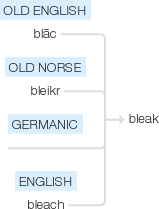Bleak
Old English blāc ‘shining, white’, or in later use from synonymous Old Norse bleikr ; ultimately of Germanic origin and related to bleach.
wiktionary
From Middle English bleke (also bleche > English bleach(“pale, bleak”)), and bleike (due to Old Norse), and earlier Middle English blak, blac(“pale, wan”), from Old English blǣc, blǣċ, blāc(“bleak, pale, pallid, wan, livid; bright, shining, glittering, flashing”) and Old Norse bleikr(“pale, whitish”) [1], from Proto-Germanic *blaikaz(“pale, shining”). Cognate with Dutch bleek(“pale, wan, pallid”), Low German blek(“pale”), German bleich(“pale, wan, sallow”), Danish bleg(“pale”), Swedish blek(“pale, pallid”), Norwegian Bokmål bleik, blek(“pale”), Norwegian Nynorsk bleik(“pale”), Faroese bleikur(“pale”), Icelandic bleikur(“pale, pink”).
From Middle English bleke(“small river fish, bleak, blay”), perhaps an alteration (due to English blǣc(“bright”) or Old Norse bleikja) of Old English blǣġe(“bleak, blay, gudgeon”); or perhaps from a diminutive of Middle English *bleye(“blay”), equivalent to blay + -ock or blay + -kin. See blay.
etymonline
bleak (adj.)
c. 1300, bleik, "pale, pallid," from Old Norse bleikr "pale, whitish, blond," from Proto-Germanic *blaika- "shining, white" (source also of Old Saxon blek "pale, shining," Dutch bleek, Old High German bleih, German bleich), from PIE root *bhel- (1) "to shine, flash, burn," also "shining white."
The original English sense is obsolete; the meaning "bare, windswept" is from 1530s; figurative sense of "cheerless" is from c. 1719. The same Germanic root produced Middle English blake "pale" (Old English blac), but this fell from use, probably from confusion with blæc "black" (the surname Blake can mean either "one of pale complexion" or "one of dark complexion"). Bleak has survived, not in the "pale" sense, but meaning only "bare, barren." Related: Bleakly; bleakness.
